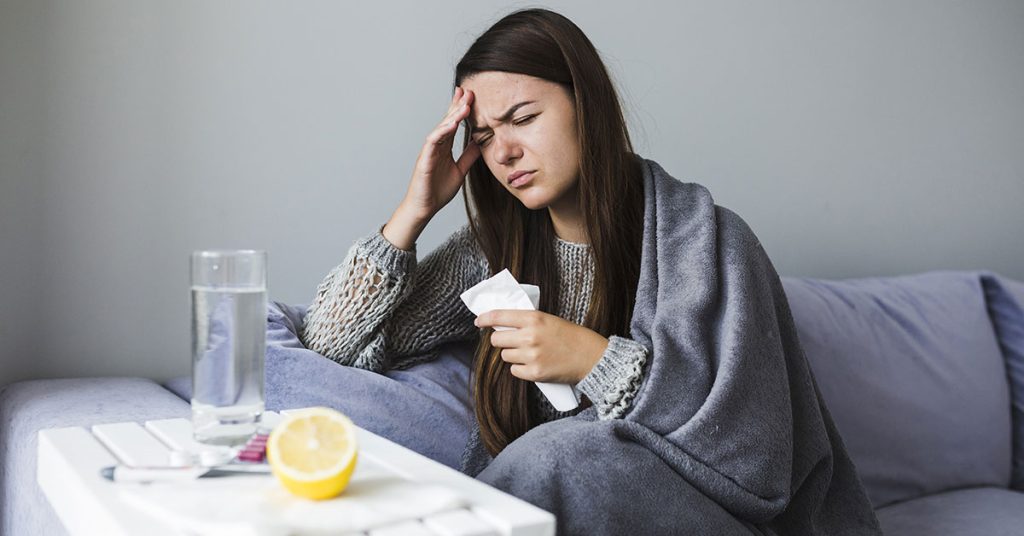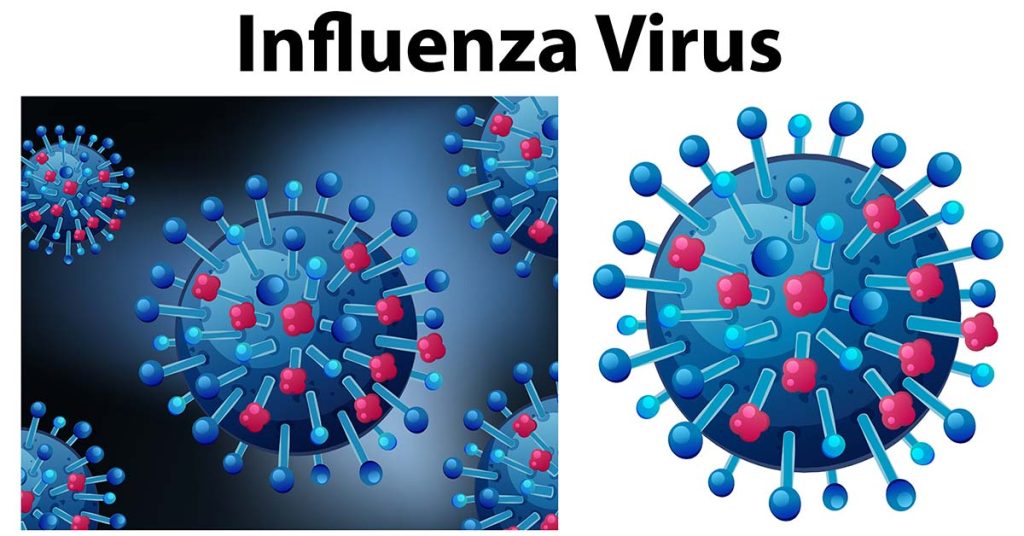What is influenza (flu)?
The flu or influenza is touted to be a viral illness of the respiratory tract (germ). Influenza is usually common in the winter and travels readily from person to person. The “flu season” in the nation lasts from October to May; it may peak between December and February.
Most people who get attacked by the flu are unwell for a week or two and then recover. In certain cases, the flu causes more serious lung infections or worsens pre-existing illnesses such as heart failure or emphysema.


Influenza Symptoms
It might be difficult to know when and why to see a doctor if you have the flu. Most of them frequently utilize home cures or buy drugs from pharmacies without contacting a doctor. To lessen the likelihood of an emergency, it is vital to visit a physician.
Examine the influenza symptoms and homeopathic therapy.
- Chest ache
- Muscle ache due to fever
- Sweating and chills
- Headache
- Dry cough
- Weakness
- A stuffy or runny nose
- Throat discomfort
- Vomiting and diarrhea
- Breathing difficulties
- Constant dizziness
- Seizures
- Dehydration (in kids)
Don’t allow the threat of sickness to keep you from enjoying the soothing winds during the monsoon season. You should follow the following basic precautions to avoid being ill:
At first look, flu patients appear to be common colds. The symptoms such as a runny nose, sore throat, and sneezing. The cold grows slowly, but the flu develops quickly, making the sufferer feel worse.
If you have been suffering for more than 48 hours, you can seek medical attention.
How can you distinguish between a common cold and influenza (flu)?
Many cold and flu symptoms are interchangeable. Viruses may cause both the common cold and the flu.
There are several distinctions with influenza. Flu symptoms frequently strike unexpectedly and lead you to get weaker and weaker. While the most painful flu symptoms typically last three to seven days, the dry cough and exhaustion associated with influenza can linger two to three weeks.
The common symptoms include increased temperature, and shortness of breath are signs that influenza is progressing. If you believe your sickness is worsening, contact your doctor straight away.
Post Flu Complication
What Are Some Frequent Complications of Influenza?
These include viral or bacterial pneumonia, dehydration, and ear and sinus infections, particularly in youngsters. Long-term medical issues such as congestive heart failure, asthma, or diabetes might exacerbate the flu.
You may also have muscle inflammation (myositis), central nervous system issues, and heart difficulties such as heart attacks, organ inflammation (myocarditis), and inflammation of the sac around the organ (pericarditis).


Who Is Most Likely to Suffer from Flu?
- Adults aged 65 and up
- Children from a minimum of 6 months to a maximum of 4 years
- Residents in nursing homes
- Adults and children suffering from heart or lung illness
- People who possess weak immune systems (HIV/AIDS)
- Women who are pregnant
How Does Pneumonia Affect You?
It can happen when the flu virus penetrates your lungs or if you acquire a bacterial infection while sick. Pneumonia may make you quite sick and may require medical attention.
Chills, fever, chest aches, and sweating are all possible symptoms. You may develop a cough that produces green or crimson mucus. You may notice a quicker pulse and a blue tinge to your lips or nails due to a lack of oxygen. Two more symptoms are shortness of breath and severe aches in your chest when you take a big breath. Seniors may only sense a stomach ache.
When you have the flu and contract a bacterial infection, your symptoms may improve at first. Then they worsen, with high fevers, increased coughing, and a greenish tinge to your cough.
Contact our experts if you experience a persistent cough, a high fever, shortness of breath, or chest pains. Homeopathy treatments are effective against bacterial pneumonia, but they are ineffective against viral pneumonia.
How Long Do Pneumonia Symptoms Last?
It can last for up to two weeks in small children, older adults, and individuals with compromised immune systems or chronic illnesses like COPD or asthma. Even healthy persons may have fatigue or weakness for a month or more after their lungs have cleared.
Can I Avoid These Difficulties?
Many are manageable. Some, however, cannot be avoided because of a weakened immune system.
If you do catch the flu, make an appointment with your doctor within 48 hours after the onset of symptoms. Inquire about flu antiviral medications. They can help alleviate your symptoms and help you recover faster if you obtain them early enough.
Preventive Tips for Influenza
Because the flu is so infectious, there are several things you may do to avoid catching it.
- Avoid Outside Food: What you eat might affect your susceptibility to viruses. Instead, make a list of immunity-boosting foods that will help you avoid becoming sick.
- Proper Hygiene: Wash your hands thoroughly with soap before and after eating, sneezing, restroom use, and other activities.
- Keep Hydrated: This aids in illness prevention and can help your body fight infections more effectively.
- Get Enough Sleep: As many people are aware that sleep is essential for the proper functioning of the body. You are more susceptible to bacterial or viral illnesses if you sleep less than 6 hours every day.
- Maintain social distancing: When you are not feeling well, especially if you have a fever, avoid being around other people
- To help your immune system: Consider taking a multivitamin and maybe vitamin D pills (Ask your doctor if they believe you need more D)
Homeopathy for Influenza Treatment
Homeopathy is a non-invasive alternative medicine that treats people’s health problems. These are made from natural ingredients; they are suitable for people of all ages.
All disorders, including long-term health conditions, can be cured with homeopathic medicine. Homeopathy operates on the premise that a little of the dosage is administered to humans in a few intervals.
Homeopathy services work by producing natural, side-effect-free miracles. Homeopathy treatment is used to treat both acute and chronic disorders, including influenza.
Under the supervision of your doctor, you can use them as a supplemental treatment for any chronic illness, such as asthma or diabetes. Intake of these will give relief from health problems by increasing the individual’s immunity.
Homeopathy services are used to restore an individual’s energy to heal. When this occurs, the folks will overcome any health issues, whether minor or large, old or new.
These medications are effective and safe for all developing illnesses, regardless of age or gender. Because homeopathic medicines are safe and have no harmful reactions, they can use them alongside other treatments.
Post Flu Complication
What Are Some Frequent Complications of Influenza?
These include viral or bacterial pneumonia, dehydration, and ear and sinus infections, particularly in youngsters. Long-term medical issues such as congestive heart failure, asthma, or diabetes might exacerbate the flu.
You may also have muscle inflammation (myositis), central nervous system issues, and heart difficulties such as heart attacks, organ inflammation (myocarditis), and inflammation of the sac around the organ (pericarditis).
Who Is Most Likely to Suffer from Flu?
- Adults aged 65 and up
- Children from a minimum of 6 months to a maximum of 4 years
- Residents in nursing homes
- Adults and children suffering from heart or lung illness
- People who possess weak immune systems (HIV/AIDS)
- Women who are pregnant
How Does Pneumonia Affect You?
It can happen when the flu virus penetrates your lungs or if you acquire a bacterial infection while sick. Pneumonia may make you quite sick and may require medical attention.
Chills, fever, chest aches, and sweating are all possible symptoms. You may develop a cough that produces green or crimson mucus. You may notice a quicker pulse and a blue tinge to your lips or nails due to a lack of oxygen. Two more symptoms are shortness of breath and severe aches in your chest when you take a big breath. Seniors may only sense a stomach ache.
When you have the flu and contract a bacterial infection, your symptoms may improve at first. Then they worsen, with high fevers, increased coughing, and a greenish tinge to your cough.
Contact our experts if you experience a persistent cough, a high fever, shortness of breath, or chest pains. Homeopathy treatments are effective against bacterial pneumonia, but they are ineffective against viral pneumonia.
How Long Do Pneumonia Symptoms Last?
It can last for up to two weeks in small children, older adults, and individuals with compromised immune systems or chronic illnesses like COPD or asthma. Even healthy persons may have fatigue or weakness for a month or more after their lungs have cleared.
Can I Avoid These Difficulties?
Many are manageable. Some, however, cannot be avoided because of a weakened immune system.
If you do catch the flu, make an appointment with your doctor within 48 hours after the onset of symptoms. Inquire about flu antiviral medications. They can help alleviate your symptoms and help you recover faster if you obtain them early enough.

